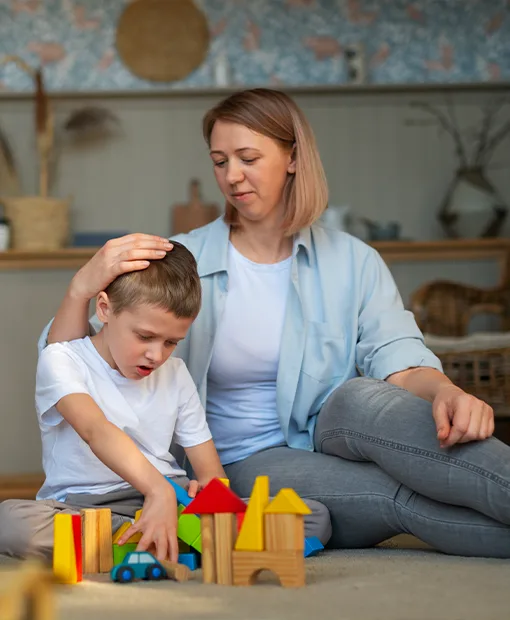Differentiated Instruction For Special Education Students
Strengthening instruction in inclusive classrooms
Course Description
Special education is defined as specially planned instruction for students with learning disabilities that meets their unique needs, allowing them to follow the general curriculum and make progress that is appropriate given their circumstances within a differentiated classroom that offers more opportunities for learning characterised by special instruction or accommodations.
This training course equips educators with the knowledge, skills, and strategies essential for providing effective instruction to students with diverse learning needs. This comprehensive program encompasses a range of topics, including understanding various learning disabilities and implementing evidence-based teaching techniques.
Participants will learn differentiated instruction methods that cater to varying abilities within an inclusive classroom setting. The course emphasizes fostering a supportive and inclusive learning environment, where students feel empowered and encouraged to progress at their own pace.
Through a combination of theoretical knowledge, practical exercises, and real-world case studies, educators gain the confidence and expertise needed to deliver specially tailored instruction that maximizes the potential of every student, ensuring they can successfully engage with the general curriculum and make meaningful progress that will support their social and emotional learning, promote positive learning and pro-social behaviors, and increase their independence.
The training course will focus on:
Introduction to Special Education
Overview of different learning disabilities, historical context and legal frameworks (The inclusion spectrum)
Evidence-Based Instructional Techniques
Multisensory teaching methods, behavior management strategies (STEP, ABA, positive reinforcement, token economy, etc.)
Differentiated Instruction
Understanding varied learning styles and paces, adapting curriculum and materials
Creating Inclusive Learning Environments
Classroom arrangement and organisation, building a supportive classroom culture
Progress Monitoring and Assessment
Formative and summative assessment strategies, data-driven decision making
Cultural Sensitivity and Diversity
Culturally responsive teaching practices, addressing cultural and linguistic differences
Training Program

Day Activities
- Welcoming of participants / Introduction of course trainers
- Ice breaking activities
- Presentation of participants and their schools / organizations
- Introduction to the training course / Activities - Workshops
- Introduction to Autism
- Introduction to Applied Behaviour Analysis

Day Activities
- Identifying and observing behaviour
- Defining and recording behaviour

Day Activities
- Functions of behaviour
- Reinforcement
- Behaviour Support Plans

Day Activities
- Group Contingencies
- Self-monitoring
- Behaviour Contracts

Day Activities
- Final activities
- Evaluation of the course
- Diploma awarding
Learning Objectives
Understanding Diverse Learning Needs
Participants will develop a deep understanding of various learning disabilities, including their characteristics, impact on academic performance, and potential co-occurring challenges.
Evidence-Based Instructional Techniques
Educators will acquire a repertoire of evidence-based teaching strategies and interventions proven to be effective for students with diverse learning needs
Differentiated Instruction
Educators will learn how to design and implement differentiated instruction to address a wide range of abilities within an inclusive classroom, ensuring all students receive appropriate levels of challenge and support
Creating Inclusive Learning Environments
The course will focus on creating a classroom atmosphere that is welcoming, accepting, and conducive to learning for all students, fostering a sense of belonging and self-confidence
Progress Monitoring and Assessment Strategies
Participants will develop skills in assessing student progress, identifying areas of improvement, and making data-informed decisions to adjust instruction accordingly
Collaborative Teamwork and Communication
Educators will learn effective strategies for collaborating with parents, support staff, and other professionals to ensure a holistic and coordinated approach to supporting students with learning disabilities
Cultural Sensitivity and Diversity Awareness
The course will promote cultural competence and sensitivity, emphasising the importance of recognising and respecting the diverse backgrounds and experiences of students and their families
Methodology
Activities and Simulations
Practical exercises, workshops, & simulations will be used to reinforce learning. This allows for critical thinking to be developed
Case Studies & Scenarios
Foster a collaborative learning environment through group discussions on artistic processes, &environmental themes. Encourage participants to reflect on their own creative journey.
Role-Playing & Simulations
Role-playing exercises will be used to simulate environments where participants will have the chance to practice effective communication skills.
Collaborative Learning
Group discussions, peer learning, and collaborative activities will encourage participants to share experiences, exchange ideas, and learn from one another.
Upcoming Sessions
| Start Date | End Date |
|---|---|
| 17 Nov 2025 | 21 Nov 2025 |
| 8 Dec 2025 | 12 Dec 2025 |
| 19 Jan 2026 | 23 Jan 2026 |
| 9 Feb 2026 | 13 Feb 2026 |
| 9 Mar 2026 | 13 Mar 2026 |
| 20 Apr 2026 | 24 Apr 2026 |
| 25 May 2026 | 29 May 2026 |
| 22 Jun 2026 | 26 Jun 2026 |
| 20 Jul 2026 | 24 Jul 2026 |
| 14 Sep 2026 | 18 Sep 2026 |
| 19 Oct 2026 | 23 Oct 2026 |
| 16 Nov 2026 | 20 Nov 2026 |
| 30 Nov 2026 | 4 Dec 2026 |

Course Packages
Bronze
Silver
Trusted By
FAQs
How can I register for the Course I have chosen?
Complete the contact form and our Erasmus coordinator will guide you through the registration process.
Where can I apply for E.U funding?
You must talk to the Erasmus coordinator of your school / organisation. This is the responsible person to apply for a fund for your mobility.
Can I pay for the fees myself if I do not receive a fund?
Yes, this is also possible. You can pay for the expenses yourself.
Where will the participants meet for the Courses? / What’s the company’s address?
It’s 4 Michail Georgalla, Engomi 2409, Nicosia, Cyprus
Does the Company offer sightseeing services? Like trips to places of interest?
Stando can give information and ideas for trips around the island or places to eat but we do not organize these trips outside the schedule of our Courses. There are however planned trips scheduled, as part of our Outdoor Courses; just have a look at the Outdoor Course detailed program or ask the Erasmus coordinator for the schedule to be sent to you.
Which hotel do you work with?
We collaborate with ASTY hotel. Its address is: 12 Prinkipos Karolou, 2373, Ayios Dometios, Nicosia, Cyprus
Can I book extra nights at the hotel?
Certainly, at an extra charge. It’s price depending whether you choose a Single, Twin or Triple room.
Are there any transport services from the airports?
Yes, apart from private taxis, an affordable service is “Kapnos Airport Shuttle”: You can book your transfer online to Nicosia from Larnaka and Paphos airport. You need to go onto their website, register and book your route.
There’s also a desk of their office at the airports, in case of flight changes:
https://kapnosairportshuttle.com/routes/4/en/1
Who provides the learning agreement between the hosting and the sending organisations?
Your Erasmus coordinator is responsible for providing you with the agreement, which needs to be filled with your personal and school information. After this is completed, you must send it to our Erasmus coordinator (standoutedu@standoltd.com) who will complete all remaining information and send it back to you signed. We also keep a copy of that for record purposes.
What’s the difference between an Indoor and an Outdoor Course?
An indoor Course takes place at the Organisation’s premises whereas an Outdoor Course has Outdoor Venues depending on the Schedule for each Course. More details on our website under each Course specifications.
What’s STANDO’s OID number?
It’s E10168250
Talk To Us!
Fill out the form to express your interest or ask questions. Our training coordinator will provide details and guide you through the application process. We look forward to welcoming you!